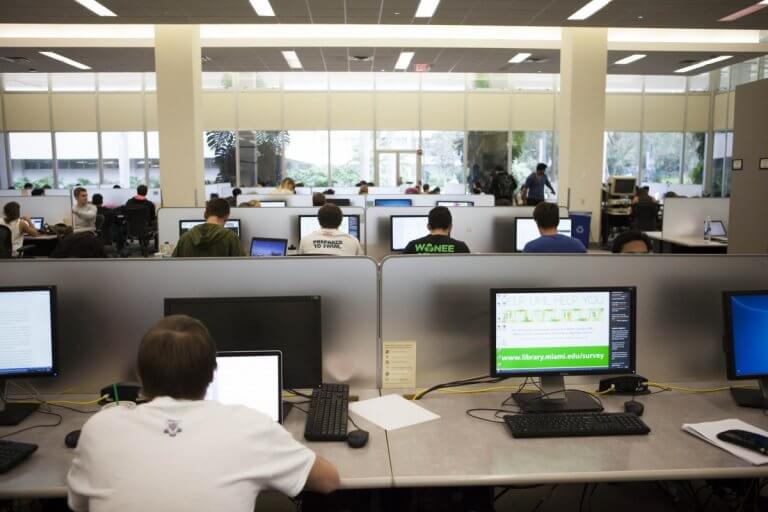
Modern industries are data-driven and managing flows of money is no exception, with increasing demand for professionals versed in the mathematical side of business. In fact, the finance industry is one of the world’s largest employers of mathematically-trained professionals.
Although, quantitative analysts, or ‘quants’, are not just required by banks – they can also be found in software companies, hedge funds, broker-dealer firms, insurance companies and the finance departments of large corporations.
So if you speak the common language of mathematics, you could be rewarded with a challenging and lucrative career in modern financial markets, software companies or a large corporation, for which a master’s is commonly regarded a prerequisite.
The College of Arts & Sciences’ Master of Science in Mathematical Finance (MSMF) program at the University of Miami comes at the perfect time. It’s an intensive, three-semester master’s degree that started in fall 2016 with a class of only 14 students, all of whom graduated the following year.

Source: University of Miami
If you want to be prepared for entrance to the worlds of finance, risk management and financial computing, this is the perfect course for you. You will receive rigorous training in mathematics, statistical analysis and computation. You will also receive an overview of the institutional operation of financial markets and exchanges.
“We emphasize contemporary quantitative tools, because increasingly, modern finance is more and more model-heavy and data-driven,” says Associate Professor Alexander Dvorsky, Program Director of MSMF.
“We’re a science department, so we keep our emphasis on mathematical models and analytic tools. The program is still young, and we are assessing what works best for the program and its students.”
Core studies in the MSMF program lean heavily toward probability, numerical analysis and programming skills applied to the mechanics of financial exchanges and markets. You will also choose from a selection of elective courses, allowing you to tailor the program to fit you own needs and interests.
Dr. Dvorsky, who has real-world experience working for a hedge fund, explains how this is a valuable course of study for the right kind of student.
“I think it’s is a very effective program for students from different backgrounds who want to do quantitative finance,” he says. “There are quite a few of them. We get people from physics and computer science who want to work in the investment field, but without going to business school where they cannot really use what they learned in undergraduate school.
“We try to enhance their math maturity. Specific knowledge is important, but so is the mathematical intuition, and we’re trying to build both in our students.”
One of those students is Calvin Yong, who will graduate at the end of the fall 2018 semester. A native of Parkland, FL, Yong earned a bachelor’s degree in mathematics from the University of Central Florida.
For someone who loves probability and statistics, the MSMF program was a logical next step. After that, Yong plans to pursue a Ph.D. in computer science and eventually work in the field of artificial intelligence (AI).
“I want to be a researcher with a focus in AI, which is quite the hot topic these days,” he says. “I want to focus particularly on deep learning, trying to get the machines to learn without being explicitly programmed. Studying mathematical finance gives me a universal array of tools useful for my goal.”
While the universal nature of mathematics allows Yong to use MSMF to boost his future AI career, most students in the program intend to pursue work in the financial industry: working for banks or hedge funds, using mathematical models to do algorithmic trading.
The diverse student body of the program includes both Western and Asian students. “Our program is demographically skewed to China,” says Dr. Dvorsky.
“Most of our students come from mainland China, where growing financial sector demands globally educated professionals. This kind of degree is very popular, there is demand form big investment banks and trading firms.”

Source: University of Miami
The University of Miami, the top ranked university in Florida, is well situated for such a master’s course, the South Florida metropolitan area is home to a large and diverse financial community, also offering a gateway to Latin America.
With close ties to the industry, the university is highly regarded by the Florida financial community, providing a window to the finance industry through seminars on trends and relevant topics.
Miami exposes students to a dynamic international environment in one of the most cosmopolitan US regions, offering a great opportunity for the study of quantitative finance.
Take an important step towards your dream career – study a Master of Science in Mathematical Finance at the University of Miami.
Follow the University of Miami’s College of Arts & Sciences on Facebook, Twitter and Instagram
Liked this? Then you’ll love these…
What it means to be a Strathclyde Maths and Statistics student
Multiply your career prospects: Five leading Universities for Mathematics







